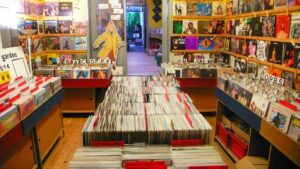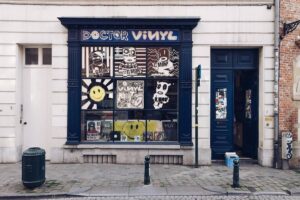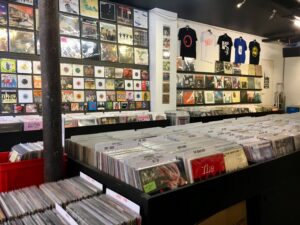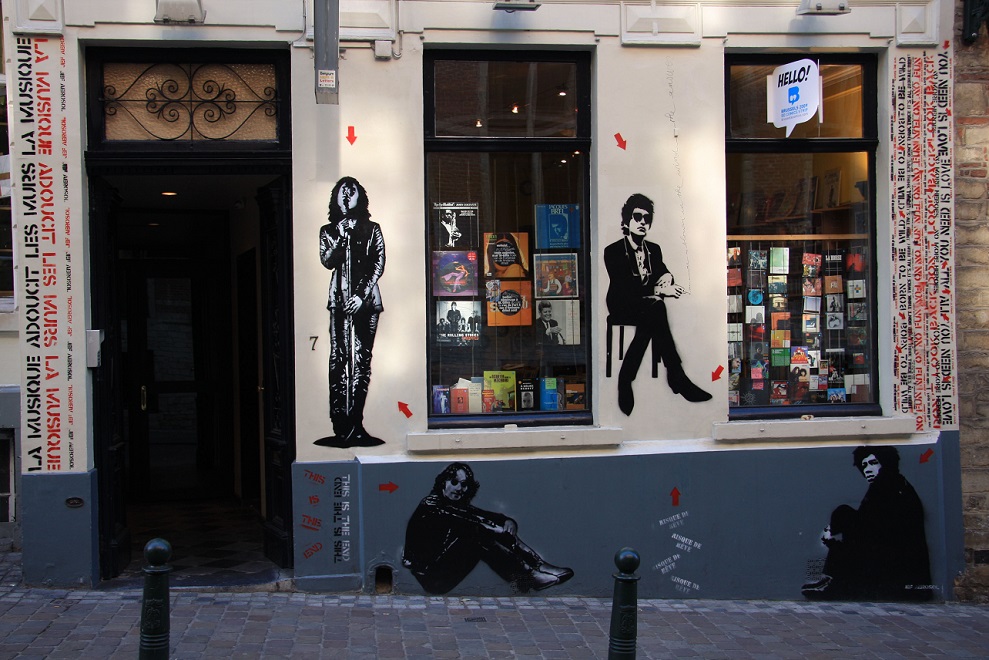Vinyl records were supposed to die out with the compact disc in the 1980s, but in today’s streaming era, they are still somehow surviving. Brussels is now a haven for the turntable holdouts and we reveal where they buy vinyl.
Are you one of those strange people that buy vinyl records although you can listen to most of the recorded music of the past century on streaming services? Then you should head down to the Marolles neighbourhood in Brussels, which has become a mecca for vinyl record stores.
Brussels was always a great place to buy vinyl. From Caroline Records on Boulevard Anspach to dance-music specialist Dr Vinyl near the Halles St Gery and collectors’ favourite Seymour Kassel on Rue de Flandre, the city has long drawn crate diggers, the obsessives who thumb through racks of records to find rarities and bargains. Juke Box Shop, one of Brussels’ oldest record shops, recently reopened after closing for two years.
But the heart of the Brussels vinyl culture is now in Marolles. Since 2016, when Crevette Records, the first of the new wave of shops opened, the area now boasts four specialist vinyl stores.
The latest is Tropicall on rue Haute, which opened in December last year, just a few months after the previous new addition, electronic music specialist Sono Ventura, also on rue Haute.
Vinyl’s natural habitat
The Marolles, a traditionally working-class district in the shadow of the Palais de Justice, is a natural place to find vinyl record shops as it is home to the Jeu de Balles flea market and dozens of antique shops lining the district’s two main streets, Rue Haute and Rue Blaes. On weekends, the area is already packed with people browsing for unusual finds.

Arlequin Records
Victor Faure, who works at Balades Sonores Bruxelles on rue Saint-Ghislain, explains why they moved to the Marolles from their previous site, opposite the Botanique concert venue. “It’s an area that we always liked and it fits with the spirit of our shop and the spirit of the market and the antique shops,” he says. “The bargain hunters can come and do their digging with us as well.”
As well as the four shops in the Marolles, there is another not far away: Dust Dealers in St Gilles, which specialises in jazz, soul, hip-hop, African and Latin American music. From the end of rue Haute, it is only a four-minute walk to the shop on the same street as the Art Nouveau Porteuse d’Eau building.
The people working in the stores are, as you would expect, music enthusiasts. Maxime Stempnierwsky at Tropicall says they listen to music for nine hours everyday.
One of the attractions of specialist vinyl shops is the expertise of the people working there, whose advice is more personal than the algorithm-generated suggestions from streaming services. “Vinyl shops will always be important for people for advice because music brings people together and allows an exchange between people,” says Stempnierwsky. “Having a physical shop allows people who share a passion for music to get together. Spotify will never replace that”.

Doctor Vinyl
Julien Dellanoy at Dust Dealers says that when you buy records on the internet “you find what you were looking for and what you know already.” He says that stores open up a real world of discovery. “In a record shop, unlike the internet, you walk out with records you would never have thought of, or you didn’t know,” he says.
Surviving in the streaming era
But how do these shops perform as a business in a time when streaming services increasingly dominate how people listen to and pay for music?
Vinyl’s share of the market for physical music formats has grown over the last 20 years and in 2020 vinyl sales overtook sales of CDs for the first time. Nevertheless, streaming services now account for 62% of the music industry’s global revenue (physical sales are only a fifth of the total, while downloads and performance rights take up much of the rest).

Veal & Geeks
Figures for vinyl sales in Belgium are hard to obtain because smaller record stores do not log their sales through the main distribution channels. “Vinyl records have become so popular that there is a terrible backlog in European pressing plants,” says Didier Gosset from Impala, the independent record labels association. “Increasing demand for vinyl is coming up against an ageing manufacturing capacity.”
For the shops that were open before COVID, the pandemic made survival a struggle, and some had to draw support from KissKissBankBank, a Belgian crowdfunding platform that backs creative projects.
Faure at Balades Sonores explains that his store, a branch of a Paris record store, almost closed during the first year in its new location. But he says that with the lockdown, sales of vinyl exploded as a reaction to the lack of concerts and because people wanted “to connect also in reaction to not being able to connect with the city and its music scene”. Sales of vinyl records by local artists have soared too, he says.
Renaud Deru at Sono Ventura says that his shop was a “COVID baby” he launched with two friends when the pandemic prevented him from working as a DJ. What kept them going was the role the shops played bring music lovers together at a time when there was no live music and the nightclubs were shut.
The growth in the number of vinyl shops and the fact that they have survived the pandemic shows that despite the increasing dominance of streaming services, people are still flocking to places where they can talk about their favourite discs and artists with others who share their passion. As Deru says, “Human contact can’t be replaced by the coldness of the internet.”

